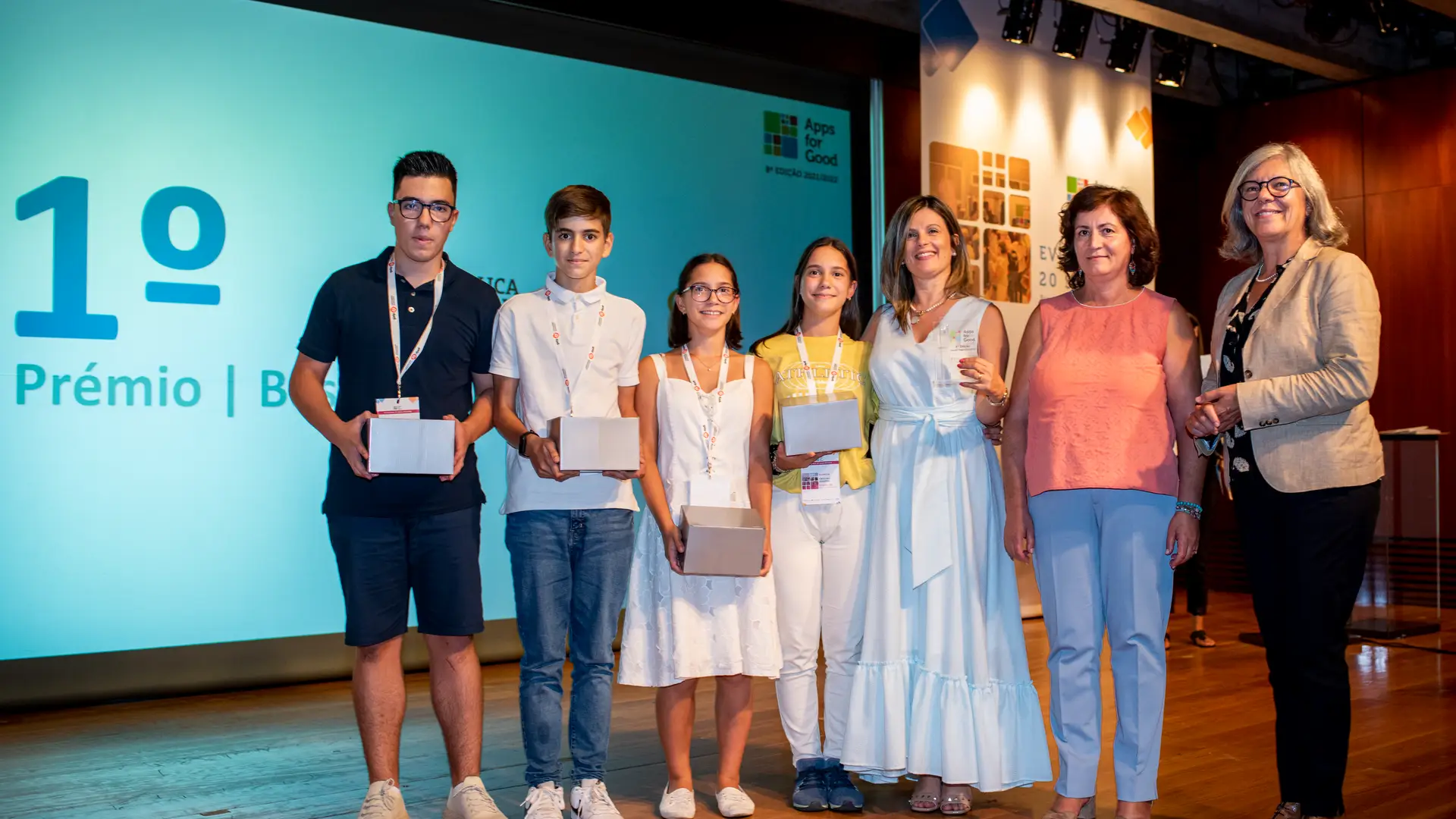Well-being and climate change were the topics of the 8th edition of the Apps for Good competition, an initiative created by CDI Portugal, a non-governmental organisation (NGO) working in the areas of social inclusion and digital innovation, in partnership with the Directorate-General of Education (DGE). Over the course of a year, the challenge set in motion for schools, students and teachers from the 5th to 12th grades motivated the teams, which dedicated themselves to developing the best smartphone or tablet application. The aim of the international programme, which originated in the United Kingdom, is to show young people the potential of technologies in the transformation of the world and societies.
The regional stages enabled the organisers to select the projects with the greatest impact in the different regions of the country, and to decide on the 22 finalists that attended the Calouste Gulbenkian Foundation for the final challenge on 22 September. The teams presented their pitches to the audience and the panel of jurors in the regional stages and on the day of the final, an extremely useful exercise in itself in the preparation of these young people for the future and for when they enter the employment market.
Once again, Galp took part in the initiative which has already seen the involvement of almost 19,000 students and more than 1,300 teachers at 536 schools across the country since 2015, providing an innovation team from its open innovation platform, Upcoming Energies, to assist participants in successfully completing their projects. “Galp has come a long way in terms of innovation”, said Ana Casaca, Galp's Global Head of Innovation, during the debate panel that preceded the prize-giving ceremony of the 8th Edition of the Apps for Good competition. “We are an incubator of ideas and people, and we are learning on a continuous basis”, she stressed. It should be reiterated that Galp – Upcoming Energies, in partnership with Apps for Good, launched the pilot course “Climate Action & Wellbeing” this year, which challenged young people to create digital and technological solutions to respond to climate change. This pilot programme, currently implemented at six schools involving a universe of 206 students, aims to encourage more sustainable attitudes and behaviour in young people. Indeed, at the end of the course, 83% of the students that participated in the initiative said they felt more informed, confident and inspired with regard to acting on climate change.
12 PRIZES FOR 7 SCHOOLS
The commitment and motivation of the participating schools were highlighted, in a transversal manner, by the members of the panel of jurors, by João Baracho, CEO of CDI Portugal, and by the representatives of the Government, the Secretary of State for Education, António Leite, and the Secretary of State for Regional Development, Isabel Ferreira. Everyone involved in the final stage of this competition was fully aware that education is increasingly transversal and that this initiative strikes a virtuous balance between technology and good. “Technology creates both opportunities and difficulties, as all technology allows for inclusion and exclusion, and has the ability to do good or bad, depending on how it´s implemented”, said António Leite. However, he stressed, “it´s our job to ensure no-one is left behind”.

The Secretary of State for Education, António Leite, highlighted the opportunities that technology provides, as well as the need to ensure that “no-one is left behind”
The high point arrived after the official speeches and when the audience was already burning with curiosity. The 12 prizes were awarded to seven schools, as each institute of education was allowed to compete with several teams, with the northern region pocketing most of the awards.
The first two places, in the Elementary and Secondary categories, were awarded to the Collect Oil and +PorSi projects, submitted by Dr. Francisco Sanches Elementary School, in Braga, and Sacavém Secondary School, respectively. The former is a solution designed to promote and motivate the population to recycle used oil, and the latter aims to improve communications between citizens and the Sacavém and Prior Velho parish council.
Second place on the podium in the Elementary Education category was awarded to the Recycle Go Give Now application, developed by youngsters from Maia Elementary School with the aim of finding containers for the recycling of specific materials and discovering where to donate items that are no longer in use. Third place went to another team from Dr. Francisco Sanches Elementary School and the School Care Students (SCS) project, developed for the exchange of essential goods among students at the school.
In the Secondary category, second and third places went to teams from the Homem Cristo Secondary School, in Aveiro, and Maia Secondary School, with the EP+ apps, designed to improve internal procedures at prison establishments, and SmartShower, which aims to help reduce the amount of water wasted in the initial stage of showering, respectively.
Among the categories backed by the sponsors, Carolina Vale, from Molelos Secondary School, in Tondela, was awarded the Young Student .PT prize, granted by .PT, for the application designed to keep disabled people and caregivers well-informed. The LP&G application, which aims to render the Portuguese Language and Portuguese Sign Language more interactive and entertaining, created by Francisca Rodrigues, from D. Maria II Secondary School in Braga, won the Young Digital Women award, granted by Synopsys.
The Climate & Energy prize, promoted by Galp – Upcoming Energies, was awarded to the EcoBox team from Vila Verde Secondary School, while the BNP Paribas Cooler Planet award went to the application designed by the Collect Oil team. The public award went to the Bus Stop app, developed by Dr. Eduardo Brazao de Castro Primary and Secondary School.











